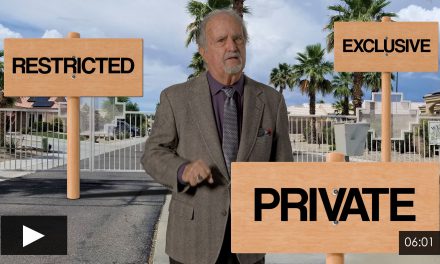This is the second episode in our new weekly video series covering property management principles. This episode distinguishes the property management activities that may be performed by a licensed or unlicensed employee.
The prior episode introduces the role of the broker performing property management activities.
Activities which only licensed employees may perform
An employee hired to assist the broker in the rental and leasing of residential complexes, other than single family units, may be either:
- licensed by the Department of Real Estate (DRE); or
- unlicensed.
Under the constant supervision of the broker, unlicensed employees may perform tenant-related negotiations in apartment and vacation rentals, such as:
- showing rental units and facilities to prospective tenants;
- providing prospective tenants with information about rent rates and rental and lease agreement provisions;
- providing prospective tenants with rental application forms and answering questions regarding their completion;
- accepting tenant screening fees;
- accepting signed lease and rental agreements from tenants; and
- accepting rents and security deposits. [Bus & P C §10131.01(a)(1)]
Further, administrative and non-discretionary duties performed by an employee of a broker who manages transient housing or apartment complexes are exempt from real estate licensing requirements while the employee is under the broker’s supervision and control. [Calif. Business and Professions Code §10131.01(a)]
Licensed employees may perform any and all of the activities unlicensed employees perform.
However, licensed employees are additionally able to perform activities relating to contacts with the landlord, as opposed to the tenant, about the leasing, care of the property and accounting.
Activities which only licensed employees may perform include:
- landlord-related solicitations;
- entering into property management or leasing agent agreements with the landlord;
- listings and rental or lease negotiations;
- care and maintenance of the property;
- marketing of the listed space; and
- accounting.
Editor’s note – Apartment building management has special licensing rules distinguishing resident managers from nonresident property managers.
A resident manager is employed by either the landlord or the broker who manages the apartment building or complex. The resident manager lives on the premises as a requirement of their employment. A resident manager and their employees do not need a real estate license to manage the apartment complex. [Bus & P C §10131.01(a)(1)]
The duties of a resident manager will be fully covered in the next episode of this series.
Contingent fees and bonus awards
https://www.traditionrolex.com/34
When a landlord is a corporation, limited liability company (LLC) or partnership, any officer of the entity may manage the entity’s property without a broker license. [Bus & P C §10133(a)(1)]
However, the unlicensed officer may not receive any contingency fees or extra compensation based on activities that require a license. They are to be salaried or on wages.
For example, a corporation owns a shopping mall managed by an officer of the corporation. The officer’s duties include maintaining the premises, locating tenants and collecting rents.
As the manager, the corporate officer is paid an annual salary as a base pay. Whenever a vacancy occurs in the mall, the manager locates a new tenant and negotiates the lease for the corporation. For each new tenant, the manager receives an incentive fee over and above their corporate salary. This acts as a bonus for their successful efforts.
Here, the manager needs to be licensed as a broker even though they are an officer and employee of the corporation that owns the property. The manager’s earnings include extra compensation based on their performance of real estate management activities requiring a license.
The manager’s receipt of an incentive bonus payment for leasing space establishes that the manager is acting as a broker, not merely as a salaried officer of the corporate owner. When the corporation holds a DRE corporate license, then the employed individual only needs to be a licensed salesperson. The exclusion of employees from licensing in residential rental complexes for tenant-related contacts does not apply to commercial leasing.
No license for LLC manager
Similarly, where an LLC owns the property, the manager of the LLC need not be licensed to manage the property — provided fees are not paid based on the quantity of leases negotiated or the LLC’s rental income. [Bus & P C §10133(a)(1)]
When the LLC manager receives a percentage of gross rents as compensation, the compensation is considered a contingent fee unless all the members of the LLC receive the same percentage.
A property manager paid on a contingency fee basis, or any other employee or officer whose pay is structured as a contingency fee, of an office building, shopping center, industrial park, apartment building or other income property will need a broker license when their duties include recruiting tenants, negotiating leases or collecting rents. However, employees of a broker dealing exclusively with prospective tenants for units in apartment complexes or vacation rentals are not required to possess a license. [Bus & P C §10131(b)]
Bonus, award, commission, incentive or contingency fee programs in excess of a base salary require the person receiving them to be licensed by the DRE, whether they are resident managers, assistant resident managers or maintenance personnel. Examples of these programs include:
- a flat dollar fee for each new tenant;
- a monthly flat dollar fee for each new tenant;
- a percentage fee based on increases in rents; and
- a percentage of monthly gross rents when rents collected for the month exceed a percentage of scheduled income.
A common “licensing” misconception
It is a widely held misconception that property managers are required to hold a Certified Property Manager (CPM) membership with the Institute of Real Estate Management (IREM) to perform property management activities.
The CPM designation is a non-required unofficial designation bestowed by a private non-regulatory organization. Brokers and agents may earn them by completing private coursework and submitting proof of a certain number of years of property management experience.
Other non-required third-party property management designations include:
- the certified apartment manager (CAM) designation;
- the accredited resident manager (ARM) designation;
- the registered in apartment management (RAM) designation; and
- the certified apartment supervisor (CAPS)
Like the certified CID manager designation, the CPM designation is not required to be employed. Unlike the CID manager designation, the criteria for obtaining these designations are entirely determined by private organizations.
The designations are often costly, and do not guarantee employment in property management. Some employers may favor such designations, while others may not recognize them at all.















This is a great topic. Very useful! All the hard work u put into this piece really shows. My full package of support. Thanks for your honesty!